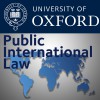The Concept of Race in International Criminal Law - and Beyond
Members of racial groups are protected under international law against genocide, persecution, and apartheid. But what is race – and why was this contentious term not discussed when drafting the Statute of the International Criminal Court? Although the law uses this term, is it legitimate to talk about race today, let alone convict anyone for committing a crime against a racial group? Who are members of a racial group and how broadly can (and should) the term be interpreted? Can international criminal lawyers draw on human rights law in the interpretation of race - or does the prohibition of analogy and the principle of strict legality bar such application? These and other questions inform the presentation.
The talk builds on the book The Concept of Race in International Criminal Law, which is the first comprehensive study of the concept of race in international criminal law. It explores the theoretical underpinnings for the crimes of genocide, apartheid, and persecution, and analyses all the relevant legal instruments, case law, and scholarship. It exposes how the international criminal tribunals have largely circumvented the topic of race, and how incoherent jurisprudence has resulted in inconsistent protection. By subjecting the problematic concept of 'race' to a multifaceted and interdisciplinary analysis, new interpretations are offered. The study argues that race in international criminal law should be constructed according to the perpetrator's perception of the victims’ ostensible racial otherness. The perpetrator’s imagination as manifested through his behaviour defines the victims’ racial group membership. The conclusions of the study are extrapolated on related cases such as the discrimination of the Sámi indigenous population of Norway.
Carola Lingaas is an Associate Professor of Law, Faculty of Social Sciences, VID Specialized University (Oslo, Norway). She holds a PhD in international criminal law from the University of Oslo. Her dissertation on The Concept of Race in International Criminal Law was published as monograph by Routledge. She has published peer-reviewed articles, book chapters, essays, research reports, and blog posts within the areas of international criminal law, human rights law, migration, and trafficking. Current research projects address hate speech against migrants and the Sámi indigenous population, dehumanizing speech as means to construct the genocidal intent, the relationship of religion and law in the crime of genocide, and the influence of politics on the jurisprudence of the European Court of Human Rights. Common to most projects is the interpretation of the law in drawing on social science research as well as the focus on matters of identity (e.g. group identities, identity creations, othering, identity fault lines). Carola Lingaas teaches domestic Norwegian welfare law, child protection law, legal method, and human rights law. She is the book review editor of the Nordic Journal of Human Rights and co-editor of an anthology and a special issue.
Prior to joining academia, she worked as legal clerk for the District Court and the Office of the Public Prosecutor of Zürich (Switzerland). She then joined the International Committee of the Red Cross as a field delegate in South Sudan during the Second Civil War. She remained with the Red Cross for more than seven years, first the ICRC, later the Norwegian and Oslo Red Cross. She holds an LLM in public international law from the University of Oslo and a master’s degree in law from the University of Zürich.




